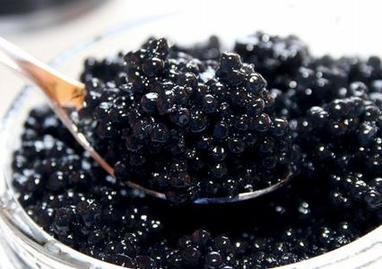The ultimate edible luxury becomes scarcer every year
Updated: 2008-03-17 15:32

Is your diet legal? Sometimes I wish mine wasn't: USDA and Japanese beef, some of my favorites, are black market foods in China. And Russian sturgeon fishing is currently banned, so if you see Russian caviar on the menu, it's poached. But rare foods are rarely cheap, and in the case of caviar, even the legal varieties are now far beyond the means of a humble food columnist. " We don't make a lot of money on caviar," David Laris tells me, "it's more a service and a prestige thing, but we have noticed sales have gone up as it's gotten more expensive." Well if that's the trend, sales should be through the roof. But, would you rather buy a kilogram of Iranian gray beluga or, say, a car? Either way you'll spend over RMB130,000 yuan.
How did this already pricey product reach unprecedented heights? China's import and transport fees add 35 percent to the price of caviar. But worldwide inflation is due to grievous overfishing of the exhausted sturgeon. In the Caspian Sea, over 21,000 tons of Russian sturgeon caviar was harvested in 1977. By 1997 there was a measly catch of less than 1,000 tons. The Convention on International Trade in Endangered Species of Wild Fauna and Flora (CITES) has been cracking down on caviar harvesting and instituting strict policies.
Laris says he supports this mission. "I don't carry Russian caviar, it's fundamentally wrong, we have to respect sustainability. We have to be responsible as chefs and restaurateurs. You can be as gourmet as you like, but respect nature at the same time." Laris has even been forced to stop making my beloved cauliflower soup, one of his specialties, because caviar is essential to the recipe. I tell him, "I remember when there was a giant spoonful of caviar in it, and then it just got smaller and smaller." He laughs and replies, "Yes, we had to take it off the menu, otherwise we'd have to raise the price and I think we'd have a hard time convincing people to buy a RMB250 bowl of soup."
For those who are willing to fork it (spoon it?) over, there's only one legitimate supplier: fine foods dealer Planet Caviar (Cafes). Their caviar import license is the first of its kind granted in China since 1949. "If you want caviar, I am the only one legally importing it," says Managing Director Jean-Pascal Salvaj. "We supply Sun with Aqua(Japanese), Jean-Georges(French), Sens &Bund(French), T8(Fusion), Laris(Fusion) and the Hilton. But other hotel brunches use Chinese caviar."
The only alternative to Planet Caviar's imported products is Chinese caviar which "sells for around RMB7,500 / kilo and sometimes tastes very muddy," according to Salvaj, because it is farmed. Quality is also linked to processing technique he says. "Caviar needs to be cleaned with seawater, then you add salt at the right percentage. The entire process should take only 13-15 minutes from the time you open the fish until the caviar is in the tin, for best quality."
Peter Ji, Executive Sous Chef at the Renaissance Yuyuan Hotel, the only hotel in town offering a caviar Sunday brunch, says, "When my boss asked me to look for imported caviar, I went to all the agents I used to buy it from and couldn't find anyone still selling it." He finally found Planet Caviar. Apparently even the "gray market" suppliers who once hand-carried the "black gold" in suitcases from Hong Kong have given up. It's gotten too expensive and risky to smuggle it. "Now, if they get caught with even a small amount," Ji surmises, "they've potentially lost a small fortune."
|
||
|
||
| Eating out:
A refuge from the surroundings
Bars&Cafes: Veterans' place Weekend&Holiday: Once is never enough Shopping: Sorting the wheat from the chaff What's on: What's new |
|
||
| Eating out:
For sporty film fanatics
Bars&Cafes: Bring your a game Weekend&Holiday: Go and play basketball Shopping: Welcoming the season What's on: When Marilyn meets China |

